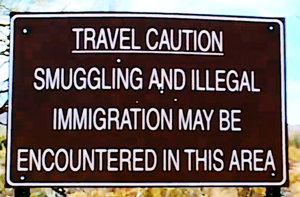A front-page article in the Washington Post breathily proclaimed that a small, self-appointed group of senators will unveil a broad overhaul of the immigration system and will stage a big announcement setting forth their accomplishment. (The text of framework is here.)

Then the senators will turn the "principles" into legislative language. Then they'll seek the White House's help to force their legislation down the country's throat. Then they'll help move it through the legislative process this spring or summer.
Ho, hum.
Meanwhile, immigration will remain one of the most contentious issues. It can spring into public salience and spur real Americans — who have real lives getting the kids to football practice and helping them with homework and scouting projects and holding down a job in one of the worst economies in 80 years — to speak up in mass that the lobbies of Big Labor and Big Business and Big Agriculture and Big Religion and Big Tech and other elitists don't speak for them on this matter.
When a self-selected handful of lawmakers gather behind closed doors, outside any normal legislative process known as "regular order", what they negotiate with themselves (in this case six senators, with a few others who've flitted in and out of the meetings) represents nothing other than a private "deal". It takes 60 senators to move legislation, even under the ill-advised dumbing down of longstanding Senate rules that protect the rights of any minority to extended debate and amendment. Any bill coming forth on a take-it-or-leave-it basis faces much tougher prospects, especially in the Senate, than legislation that comes forth the normal way through the normal committee process. Preordained packages don't have the legitimacy of regular-order measures.
Substantively, the main point of this outline is mass amnesty for all 11 million illegal aliens. The shiny objects the tricksters dangle about employment verification and border enforcement are nothing. They're nonstarters for those who've paid attention to past immigration debates. Sure, beefing up border security (which the Obama administration has actually neutered) and making it mandatory to verify through E-VERIFY employees' eligibility to work in the United States are necessary. But they aren't sufficient. They're on the fringe of what's needed to qualify as legitimate "reform" of our immigration system. If you want to legalize millions, then you need to come to the table and bargain on massive cuts to legal immigration levels.
Of course, that's not part of the gangsters' talks. And it's not raised by their enablers in the ethnic advocacy circles to whom the lawmakers are pandering.
So, the dynamics of how this round has begun are looking like a B movie that we've seen before.
In 2007, when a similar self-appointed group of senators (some of the same ones) produced a big amnesty plan they'd spent weeks secretly drawing up, it ultimately got the backing of the Bush White House and moved in the Senate. But a funny thing happened on the way to enactment. The American people weighed in. They shut down the Senate phone system. They booed senators (again, some of the same ones again gathering in back rooms) in prominent venues back home for playing footsy with rewarding foreign lawbreakers. The same special interests all lined up for amnesty — and lost. Proponents couldn't get 60 votes.
Now, the lame-duck president is weighing in. But Obama is hardly a Ronald Reagan or a Bill Clinton in terms of exercising presidential leadership or charming legislators. In fact, Obama's bitterly partisan, slap-in-the-face approaches on so many fronts — particularly his several highly questionable end runs on the separation of powers — have poisoned the well. Obama is hardly a model for fostering bipartisan cooperation.
Even at this stage on immigration, the White House is gratuitously poking Republicans. "What has been absent in the time [since] he put principles forward is a willingness by Republicans to move forward with comprehensive immigration reform", said White House spokesman Jay Carney. Goading is not courting. Such tactics are impolitic.
Resorting to end-run amnesty (e.g., Deferred Action for Childhood Arrivals, and "prosecutorial discretion" orders to let illegals go), suing states exercising their inherent police powers to deal illegal aliens, dismantling the 287(g) program, using executive orders and regulations to legislate, and "recess" appointing his most controversial political picks to office even when the Senate remained in session have all sown seeds of distrust and displayed utter disrespect for the Constitution's required processes. Obama may be on the waning side of the curve, with the federal appellate court rejecting his National Labor Relations Board recess appointments while the Senate remained in session.
The sad thing is that by demanding a "comprehensive" bill to give the open-borders crowd everything on its wish list in one package, the special interests and the gangsters (there's a similar working group on the House side, too) and the administration may have condemned all progress on a highly emotive, highly controversial, multifaceted issue. Much more wisely, especially after the administration's track record of bad blood, would be to act on small pieces of immigration one at a time, starting with enforcement in the interior and in the workplace involving state and local police, at the border, and allowing a couple of years for consistent enforcement to decrease the size of the illegal alien population before addressing more contentious issues like guestworkers and legalization. But this is Washington, so common sense doesn't really apply.
